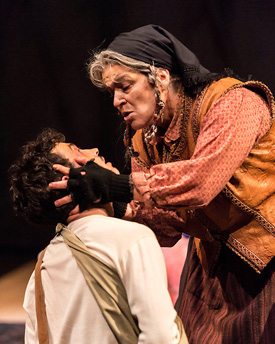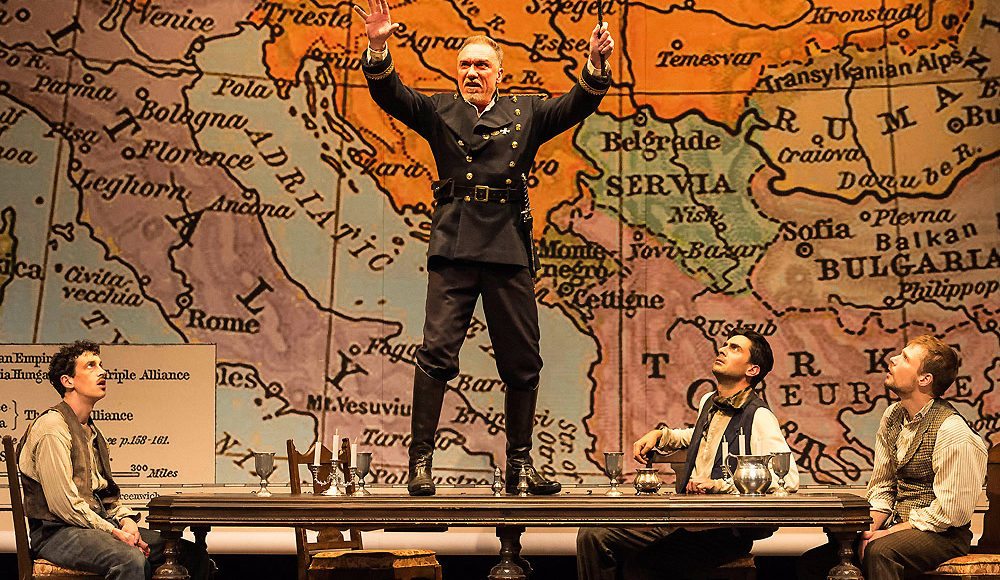Rajiv Joseph’s new play Archduke (now at downtown’s Mark Taper Forum) tries to maneuver, with grace, between the parallel bars of Barbara Tuchman and Groucho Marx; a feat demanding true Olympian dexterity to execute successfully.
But then, Joseph has displayed prodigious creative gymnastic skills in his prior works, Bengal Tiger at the Baghdad Zoo and Guards at the Taj.
In Archduke, Joseph attempts to examine one of history’s most momentous events through the lens of Duck Soup’s “drooping eyes spring glasses.”
It is June of 1914 and the humanitarian Dr. Leko (Todd Weeks) has a very sick, young man in his free clinic. The gangly Gravrilo (Stephens Stocking) is not only ill, but incredibly maladroit. Between bouts of coughing up blood and expressing his grief at soiling the handkerchief of the Doctor’s late wife, he manages to destroy the doctor’s anatomical display skeleton in a whimsical act of bumbling; not without a tint of foreshadowing.
After Gravrilo’s exit, the good doctor is visited by Dragutin (Patrick Page), aka “Apis” meaning the “the Bear.” As the nickname implies, Dragutin is anything but clumsy. In short order, he asks Dr. Leko for a list of his “lungers”; men who are inflicted with TB. The doctor refuses at first. However a visit, soon after, from the knife-wielding Trifko (Bryan Porter)—one of Dragutin’s thugs—forces him to reconsider.
The doctor arranges a clandestine warehouse rendezvous, where Gravrilo and his fellow TB patient Nedeljko (Josiah Bania) are met by Trifko, and—after a scene which has the feel of a prolonged “Who’s on First?” skit about it—are conveyed to the manor of “the Bear.”
At an ornate dining room with, a huge map of the Balkans draped behind it, we are finally immersed in the plot fueling Joseph’s narrative which provides, for any historically-challenged audience member, a crash course in the geo-political status of Southeastern Europe at the opening of the 20th century.
For it is here that Dragutin feasts the young men, while firing them up for a greater destiny than that which awaits them: The liberating of their people through the assassination of the Archduke Ferdinand.
Dragutin harangues, sermonizes and cajoles; fulfilling the function of good cop/bad cop solely between the constant interruptions of his unkempt, hunched-over servant Sladjana (Joanne McGee) a coarse, motherly Morrígu figure.
Two more brief scenes take us to the end of the play with the three young men traveling in first class accommodations as the Sarajevo Special carries them to a destiny that would become the global disaster known as “The Great War,” “The War to End All Wars,” “World War One.”

Stephen Stocking, Ramiz Monsef, Todd Weeks, Josiah Bania in “Archduke.” (Photo by Craig Schwartz – Courtesy of Center Theatre Group)
Joseph has chosen a viable historical candidate for the frame of his farce; for the actual assassination of the Archduke and the bumbling of the nations of Europe into war does have the earmarks of a clown show, but one in which the greasepaint would quickly be washed away by the blood of 38 million.
Archduke, is well-served by its cast.
Stocking, Bania, and Porter (stepping in for the absent Ramiz Monsef) are solid in the execution of their bumbling antics. But their performances are most effective when we see their wide-eyed wonder, while aboard the Sarajevo-bound train, at the luxuries of the world they are soon to destroy. This scene achieves an eerie reflection of the recruits who carried out the 2008 terrorist attacks on Mumbai, India. (*)
Page is the evening’s power house, ranting and raving with a brash bravado one moment, then oozing fatherly love the next as he manipulates the pliable young men he’s gathered towards the act of murder. Page’s chock-a-block performance makes it clear why he garnered such universal praise as Norman Osborn/The Green Goblin in Julie Tamor’s 2010 musical Spider-Man: Turn Off the Dark.
Weeks as the “good doctor” suffers, not in the actor’s execution of the part, but the playwright’s delineation of the role. If the role of the doctor, and the two scenes involving him were cut from a Saturday matinee performance, no one in the audience would be any the wiser.
Never a good sign.
Archduke is both rambunctious and comic, and this carries it to the final curtain; on a cloud of laughter evoked from those attending. But after that cloud diminishes, nothing is left in its place.
The fault, I’m afraid, falls on Joseph in that he never clarifies whose play this is that we’re watching. The opening scene is indicative of the muddle.
There is Dr. Leko, but his character is too slender to be bear the weight of the protagonist. There’s Gravrilo, but his character is too frenetic, bouncing from one emotional extreme to another, never allowing for either an evaluation or an acknowledgement on behalf of the audience as to his function in the proceeding. Dragutin is the obvious antagonist and the most fully-developed character, so much so that he threatens to overwhelm the work as Satan does Paradise Lost and Mercutio nearly does to Romeo and Juliet. Finally, there is Trifko, but his appearance is both too brutal and too brief.
So, at the end of an extended first scene, the audience remains clueless as to whose pocket they should slip in and ride to the final curtain. And this issue is never addressed.
There is another problem. Off the top of my head three successful farces about war come to mind: Dr. Strangelove or: How I Learned to Stop Worrying and Love the Bomb (1964), In the Loop (2009) and the 1963 British musical Oh, What a Lovely War! What all three have in common is a thin layering of history spread over the farcical elements themselves.
Archduke is history-heavy, which would not necessarily be a bad thing if there was an equal amount of characterization to balance it out. There is not.
What Archduke is, however, is fun. Rough and tumble fun with amusing dialogue such as when Bania’s sweetly befuddled Nedelijko describes sex as “Like taking a bath with a bunch of rabbits.”
Fun but little else.

Stephen Stocking and Joanne McGee in ‘Archduke.’ (Photo by Craig Schwartz – Courtesy of Center Theater Group)
The single moment in the play where the possibilities of the piece are revealed is found in the strongest scene and most sincere performance of the production.
This is when the old Sladjana (McGee) brings a sack of provisions to Gravrilo before his departure for the train station, explaining to him how there’s enough within for the trip to Sarajevo – or even farther if three young men should wish to disembark before reaching their final destination and run far, far away to escape the fate that Dragutin has fitted them with.
McGee fills the moment masterly with the futility of hope, helping the audience to feel, for the first and only time in the play, any pity for the doomed young innocent who will shortly unleash on the world its greatest slaughter and loose his life to become a smudge on history known as Gavrilo Princip.
Scream at the absurdity down life’s tragic cavern and you’ll hear the voice of farce in the echo back.
McGee’s anguished, silent scream down the depth of Stocking’s exquisite naivety achieves a faint and brief echoing of that absurdity.
They say, “The meek shall inherit the earth.”
I say, “God help us if they ever do.”
In this single scene, I think one can glimpse the play Joseph hoped for, but which he fails in presenting.
Archduke won’t be taking home the Gold, but Silver isn’t bad.
♦ ♦ ♦
(*) For a chilling account of this assault you can turn to the documentary Terror in Mumbai (2009)
Pictured in Featured Image: Stephen Stocking, Patrick Page, Ramiz Monsef, Josiah Bania (Photo by Craig Schwartz – Courtesy of Center Theatre Group)
♦ ♦ ♦
Archduke is running now thru June 4 at
Mark Taper Forum
Downtown, Los Angeles
Tickets are expected to go fast. Phone now to snag your reservation. Click HERE.
Support the Voices of The TVolution
Like us on Facebook and Please Subscribe!





